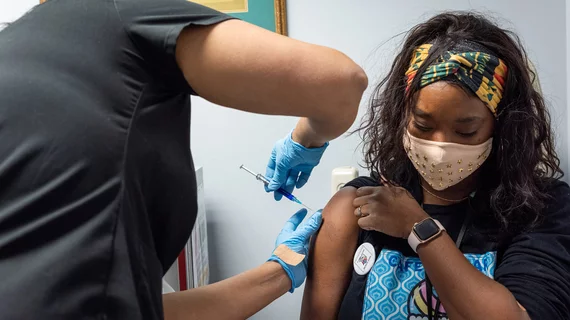COVID-19 public health emergency to end in May
The Biden administration will wind down the public health emergency (PHE), which was issued at the start of the COVID-19 pandemic, on May 11.
The PHE has been in place for the last three years after being continuously expanded every 90 days. It was most recently extended to mid-April by the Department of Health and Human Services (HHS).
“The COVID-19 national emergency and public health emergency (PHE) were declared by the Trump Administration in 2020,” the White House's Office of Management and Budget (OMB) said in a statement. “They are currently set to expire on March 1 and April 11, respectively. At present, the administration’s plan is to extend the emergency declarations to May 11, and then end both emergencies on that date.”
By declaring a PHE, healthcare providers were awarded new flexibilities that aimed to increase access to care, such as new telehealth benefits. In addition, the PHE expanded healthcare coverage under Medicaid to millions more Americans by extending eligibility. According to a recent analysis by the Robert Wood Johnson Foundation and the Urban Institute, an estimated 18 million people are on track to lose Medicaid coverage when the PHE ends. That’s the biggest change in healthcare insurance coverage since the Affordable Care Act (ACA) was implemented.
Under the PHE, Americans were provided free COVID-19 testing, treatments and vaccines, and some of that free cost could change once the PHE ends.
HHS has previously said it would give healthcare stakeholders at least 60 days’ notice before ending the PHE, and the White House noted its plan to end the PHE in May aligns with that protocol. The PHE created major changes for healthcare providers and payors, and ending it will again create significant disruptions to how care has been provided during the COVID-19 pandemic. This fact was acknowledged by the White House, which also noted Congress enacted an orderly “wind-down” to transition patients to new insurance plans and ensure state budgets don’t fall off a cliff.
“First, an abrupt end to the emergency declarations would create wide-ranging chaos and uncertainty throughout the health care system––for states, for hospitals and doctors’ offices, and, most importantly, for tens of millions of Americans,” the White House said in its statement. “During the PHE, the Medicaid program has operated under special rules to provide extra funding to states to ensure that tens of millions of vulnerable Americans kept their Medicaid coverage during a global pandemic. …If the PHE were suddenly terminated, it would sow confusion and chaos into this critical wind-down.”
The White House also acknowledged that healthcare providers will face disruptions to care flexibilities if an abrupt end to the PHE comes to pass. Plus, veterans, individuals behavioral health needs and rural patients are at risk of losing access to telehealth care services from an abrupt end of the PHE.
“Additionally, hospitals and nursing homes that have relied on flexibilities enabled by the emergency declarations will be plunged into chaos without adequate time to retrain staff and establish new billing processes, likely leading to disruptions in care and payment delays, and many facilities around the country will experience revenue losses,” the White House said.
The announcement from the White House comes as the House of Representatives in Congress is set to vote on a bill, the Pandemic is Over Act, that would immediately end the PHE, The New York Times reported. Both actions coincide with the rise of a new, highly-contagious strain of COVID-19, XBB.1.5, which accounted for more than half of all COVID-19 cases nationwide as of Jan. 21, 2023. More than 1.1 million Americans have died of COVID-19 since the start of the pandemic, and the number of new weekly cases is currently around 295,000, while new weekly deaths have risen to more than 3,700 and new weekly hospitalizations is also roughly 3,700, according to the latest data from the Centers for Disease Control and Prevention.
For the millions currently enrolled in Medicaid who became eligible under the PHE, the spending package approved in late 2022 addressed the eligibility changes by setting a deadline for state budgets to lose additional Medicaid funding. This gives states more time and choice in changing Medicaid eligibility once the PHE ends. In addition, the package extended telehealth benefits through 2024.

